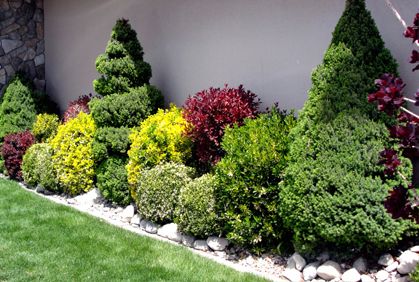A professional garden designer chooses landscape shrubs and bushes in a certain way, while an inexperienced home gardener chooses them in another. The novice tends to go for plants that he or she has seen and liked in parks, gardens, and nurseries. The landscape architect or garden designer on the other hand, while taking personal preference into account, works according to a set of principles, which unlike other aspects of design, can be readily applied by the average home gardener.
To think like a professional, do not at first have specific plants in mind, but rather distinguish between the various design functions that shrubs perform in the garden, and then choose those species that fit the design criteria you have established. It’s like a manager choosing from a list of candidates, the person or persons for a certain job in the company. Certainly, subjective factors play their part, but primarily, the hirer will be looking at the objective credentials of the candidates, such as qualifications and work experience. Here then are some of the “qualifications” that your “candidates”, i.e. your shrubs, should possess before including them in the garden.
Sheared Hedges
The role of a neatly trimmed, sheared hedge is to act either as a formal screen or as a background to some showy focal point. Not every shrub is suitable for the purpose. As a relatively formal garden element, the plant’s foliage should be neat, small, and of fine texture. Plants with large leaves and course texture, like Hibiscus for example look poor and ragged after the hedge trimmer has been at them. That is why “unspectacular” bushes such as Pistacia lentiscus or Myrtus communis make excellent trimmed hedges.
It is tempting to choose species that grow quickly, but this is not necessarily wise in the long run, as rampant plants, like Elaeagnus pungens, are more difficult to maintain on a regular basis. Undoubtedly, that is the reason why the “boring” Privet plants (Ligustrum sp.) are often the choice of the landscape professional.
Informal Screens
Shrubs that are grown as loose, informal screens are usually more suited to larger spaces as opposed to small backyard gardens. The plants can be larger, faster in growth, and have courser leaf texture, than those designated as trimmed hedges. As screens, they ought to be evergreen, and to recover well from pruning. Examples include species of Viburnum, Myoporum, Cocculus. Conifers, such as the large varieties of Juniper, are especially suitable, as they generally do not require pruning
Flowering Shrubs
A landscape bush that acts as a screen can also double up as a flowering shrub. It is worth distinguishing here between those such as Plumbago, that bloom almost continuously through the growing season, and others, like Grevillea and Callistemon, that have a brief, seasonal, flowering period. Strangely, the continual flowerers often produce negative reactions amongst homeowners, perhaps according to the principle that familiarity breeds contempt! They are best used in the farther reaches of large gardens, and perhaps avoided in small spaces. With regard to color, shrubs that sport decorative fruit should not be overlooked.
Sculptural and Emphasis Plants
I addition to screening and background functions; a number of shrubs are highly decorative as individual specimens, creating either a clear focal point or a subtle emphasis amongst a mass of “regular” plants. Yucca and Plumeria for instance, have definite sculptural qualities, while the colored foliage of purple-leaved plants creates a striking contrast. The key with such “special” plants is to use them as sparingly and carefully as possible. Nothing shows up the amateur more, than the sight of plants with purple, silver, or variegated leaves, dotted throughout the garden.
Article Source: http://EzineArticles.com/1513338

